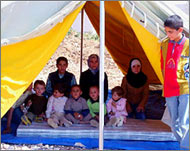House demolition as terror
When eight-year-old Mamdouh Nassar returned home from school one day last week, he found just a pile of rubble where the family house once stood.

Broken pieces of furniture and twisted window bars protruded from the mound and broken glass lay everywhere.
Mamdouh’s books, clothes and small bicycle, with which he used to run errands for his mother in the small village of Dura in the southern West Bank, were all crushed beneath the rubble.
So was his second-hand computer that his father had bought him the previous month.
Everything else the family possessed too was gone.
Mamdouh’s family had been accused of harbouring a member of Islamic Jihad, Majed Abu Doash. The Israeli army assassinated Doash as he left the family’s house unarmed.
On fire
Following Majed’s death, Israeli forces began pounding the three-storey home with artillery shells and short-range rockets, setting the premise on fire.
The tragedy of the Nassar family epitomises the plight of thousands of Palestinian families that have fallen victim to one of the most devastating aspects of the Israeli occupation.
 |
|
Mamdouh’s family paid a heavy |
Since the outbreak of the Palestinian Intifada, or uprising, against Israel’s occupation three years ago, the Israeli army has destroyed as many as 3000 Palestinian homes. Not a day passes without the Israeli army demolishing another home and dooming another family to homelessness, misery and poverty.
From the very beginning of the Intifada, the wanton destruction of Palestinians’ homes and possessions became one of Israel’s chief means of tormenting the civilian population.
In the last few months, the Israeli army has stepped up the practice, resorting to dynamiting multi-storey apartment blocks.
On 10 September, an eight-storey building in downtown Hebron in which more than 30 families were living was dynamited and then levelled after two resistance fighters barricaded themselves on the rooftops.
No excuse
The two fighters were killed by Israeli occupation troops, a fact that should have left no excuse for demolishing the building and destroying the lives of so many innocent men, women and children who had committed no wrong.
Jawad al-Kawasmi, a Hebron citizen in his mid 40s, spent all his and his wife’s savings to purchase an apartment in that building. They have now lost everything: their home, their possessions, their dreams and their peace of mind.
“My family and I had just moved in, having succeeded after many years of hard work in owning a place I could call home. We thought we were the happiest family on earth. Now, we have lost everything, everything” he says.
Al-Kawasmi’s next-door neighbor, Hasan Ajlouni, who also lost his apartment, lashes out at the international community for allowing Israel to “gang up like this on a defenceless people”.
 |
|
Unimaginable pain is inflicted on |
“Israel is not the only criminal party. The whole world, including the Arab world, is accomplice to this holocaust against a helpless people whose only crime is its enduring determination to keep living in its ancestral homeland.”
Zio-Nazi
He had especially harsh words for Arab governments who he said “are playing deaf and dumb and looking the other way while this Zio-Nazi entity is killing us and destroying our homes.”
Ajlouni is no stranger to suffering. At the beginning of the Intifada, Israeli troops shot and killed his seven-year-old son, Fadi, as he was returning home from school.
A few months later, Ajlouni himself sustained a gunshot wound in his right foot from which he has not fully recovered.
In fact, the day the building was destroyed, Ajlouni was visiting an East Jerusalem doctor for further treatment.
“When I returned home, I found rubble and an empty tent awaiting me… there was nothing, not a piece of underwear, not a pair of pyjamas, not a blanket, nothing…I found a life-time savings reduced to rubble.”
There is a calculated cruelty to the Israeli policy of home demolitions.
Normally, Israeli troops storm the doomed house or apartment building shortly before dawn, terrorising the still-sleeping occupants with gunfire and stun grenades before herding them out at gunpoint.
Then in a matter of minutes, the premise is dynamited or bulldozed, while shocked women and children are made to look on.
Before the Palestinian Intifada, the Israeli army used to give occupants a 20-minute grace period to remove some of their belongings from the doomed building.
Pain
Now, demolitions take place without warning and occupants are not allowed to save anything. The aim is to torment, inflict pain, and wreak as much havoc as possible.
|
Arab governments “are playing deaf and dumb and looking the other way while this Zio-Nazi entity is killing us and destroying our homes” Hasan Ajlouni, Dura resident |
“They wouldn’t allow us to take the children’s books, or even a baby diaper, or a pair of shoes,” said Fatima Nassar, whose home was destroyed last week.
In some instances, Israeli bulldozers have demolished homes and buildings right on top of their occupants as happened during battles in Jenin, Rafah and Khan Yunis.
Home demolitions are considered a war crime under international law and the fourth Geneva Convention. However, since 1967, Israel has consistently ignored all legal, ethical and human norms.
To the Palestinians who attach a great social and psychological value to their homes, only death is a greater calamity.
Indeed, if a Palestinian wants to express extreme condemnation to someone in Arabic, he says “Yikhrib Beitak,” meaning “May your home be destroyed”.